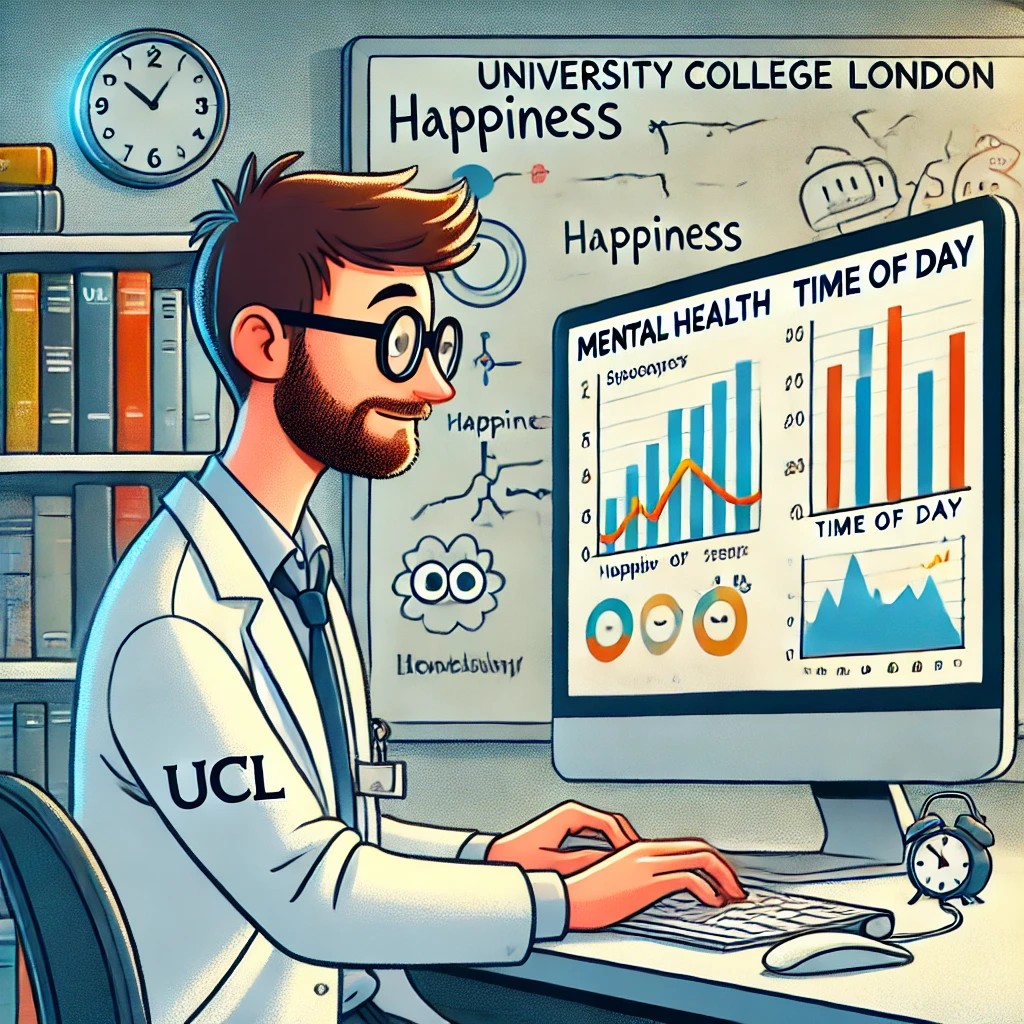A study from University College London found that people feel worse as the day goes on. The worst feelings happen at midnight and on Sundays. People start their day feeling good, but feel less happy by nighttime. On weekends, feelings change more compared to weekdays.
The study looked at answers from 50,000 adults over two years. They asked about happiness, life satisfaction, and feeling worthy. People felt happiest on Mondays and Fridays. Feeling lonely didn’t change much during the week.
The study can’t say exactly why these feelings change. It might be because of changes in the body, like hormone levels. What people do on weekdays and weekends might also affect how they feel. The researchers think more studies are needed to understand this better and help improve mental health support.
Original news source: Scientists find that things really do seem better in the morning (The Guardian)
🎧 Listen:
Slow
Normal
Fast
📖 Vocabulary:
| 1 | satisfaction | Feeling pleased or happy with something |
| 2 | worthy | Having value or being good enough |
| 3 | hormone | Chemicals in the body that control how we feel |
| 4 | researchers | People who study and find out new things |
| 5 | improve | To make something better |
| 6 | mental | Related to the mind or brain |
| 7 | support | Help or assistance |
| 8 | loneliness | Feeling alone or without friends |
| 9 | exactly | In a precise or correct way |
| 10 | affect | To change or influence something |
| 11 | compared | Looked at how things are different or similar |
| 12 | understand | To know or figure out something clearly |
Group or Classroom Activities
Warm-up Activities:
– CHARADES
Instructions: In small groups, students will take turns acting out different feelings mentioned in the article (e.g., happiness, loneliness, feeling worthy) without speaking, while their classmates guess the emotion. This helps them connect emotions to vocabulary.
– OPINION POLL
Instructions: Students will walk around the classroom and ask their classmates questions like “Do you feel happier on weekends or weekdays?” and “When do you feel the most lonely?” They will tally the responses and share their findings with the class, helping practice speaking and listening skills.
– THINK-PAIR-SHARE
Instructions: Students will think individually about how their feelings change throughout the week. They will then pair up with a partner to discuss their thoughts before sharing with the whole class. This encourages speaking practice and sharing personal experiences.
– HEADLINE CREATION
Instructions: In pairs, students will create catchy headlines based on the article’s findings about happiness throughout the week. They will present their headlines to the class, practicing writing and speaking skills.
– VOCABULARY PICTIONARY
Instructions: Students will draw pictures representing key vocabulary from the article (e.g., happiness, satisfaction, loneliness) on the board while their classmates guess the word. This visual activity enhances vocabulary retention.
🤔 Comprehension Questions:
1. What did the study from University College London find about people’s feelings during the day?
2. When do people feel their worst according to the study?
3. How do people feel at the beginning of the day compared to the end of the day?
4. On which days do people feel happiest, based on the study?
5. How many adults were asked in the study?
6. What are some reasons the study gives for why feelings might change?
7. What do the researchers want to do next to help understand feelings better?
Go to answers ⇩
🎧✍️ Listen and Fill in the Gaps:
A study from University College London found that people feel worse as the day goes on. The (1)______ feelings happen at (2)______ and on Sundays. People start their day feeling (3)______, but feel less happy by nighttime. On (4)______, feelings change more compared to weekdays.
The study looked at answers from 50,000 adults over two (5)______. They asked about happiness, life (6)______, and feeling worthy. People felt happiest on (7)______ and Fridays. Feeling lonely didn’t change much during the (8)______.
The (9)______ can’t say exactly why these feelings change. It might be because of changes in the body, like hormone (10)______. What people do on weekdays and weekends might also affect how they (11)______. The researchers (12)______ more studies are needed to understand this better and help improve mental health support.
Go to answers ⇩
💬 Discussion Questions:
Students can ask a partner these questions, or discuss them as a group.
1. What is a happy day for you?
2. How would you feel if you had to work every day of the week?
3. Do you like Sundays? Why or why not?
4. What is a time when you felt really happy?
5. Do you think people are happier on weekends? Why?
6. How would you feel if you had no friends to spend time with?
7. What is a thing that makes you feel better when you are sad?
8. Do you think it is important to talk about feelings? Why?
9. How would you feel if every day was the same?
10. What is a fun activity you like to do on weekends?
11. Do you think people feel different at night than in the morning? Why?
12. How would you feel if you had to stay home all weekend?
Individual Activities
📖💭 Vocabulary Meanings:
Match each word to its meaning.
Words:
1. satisfaction
2. worthy
3. hormone
4. researchers
5. improve
6. mental
7. support
8. loneliness
9. exactly
10. affect
11. compared
12. understand
Meanings:
(A) Chemicals in the body that control how we feel
(B) Related to the mind or brain
(C) Feeling pleased or happy with something
(D) In a precise or correct way
(E) To know or figure out something clearly
(F) People who study and find out new things
(G) Looked at how things are different or similar
(H) Feeling alone or without friends
(I) Having value or being good enough
(J) To change or influence something
(K) To make something better
(L) Help or assistance
Go to answers ⇩
🔡 Multiple Choice Questions:
1. What did the study from University College London find about people’s feelings during the day?
(a) People feel better as the day goes on
(b) People feel the same all day
(c) People feel happy only in the morning
(d) People feel worse as the day goes on
2. When do people feel their worst according to the study?
(a) In the morning and on Mondays
(b) During lunch and on Fridays
(c) In the afternoon and on Saturdays
(d) At midnight and on Sundays
3. How many adults did the study look at?
(a) 10,000 adults
(b) 50,000 adults
(c) 25,000 adults
(d) 100,000 adults
4. On which days do people feel happiest?
(a) Mondays and Fridays
(b) Wednesdays and Thursdays
(c) Saturdays and Sundays
(d) Tuesdays and Saturdays
5. What feeling did not change much during the week?
(a) Feeling happy
(b) Feeling tired
(c) Feeling lonely
(d) Feeling excited
6. What might cause changes in feelings according to the study?
(a) Changes in the weather
(b) Changes in food
(c) Changes in the body, like hormone levels
(d) Changes in friends
7. What do the researchers think is needed to understand feelings better?
(a) More studies
(b) Less talking
(c) More games
(d) Fewer questions
8. What is one goal of the study?
(a) To make people feel worse
(b) To help improve mental health support
(c) To change people’s jobs
(d) To make weekends longer
Go to answers ⇩
🕵️ True or False Questions:
1. The study asked 50,000 adults about their happiness and life satisfaction.
2. People start their day feeling happy but feel less happy by nighttime.
3. People feel happiest on Tuesdays and Thursdays.
4. A study from University College London looked at how people feel during the day.
5. People feel the worst at noon and on Saturdays.
6. Feelings change more on weekends than on weekdays.
7. Feeling lonely changes greatly throughout the week.
8. The researchers do not want to do more studies to help understand feelings better.
Go to answers ⇩
📝 Write a Summary:
Write a summary of this news article in two sentences.
Check your writing now with the best free AI for English writing!
Writing Questions:
Answer the following questions. Write as much as you can for each answer.
Check your answers with our free English writing assistant!
1. What did the study from University College London find about how people feel during the day?
2. When do people feel the happiest according to the study?
3. What time of day do people feel their worst feelings?
4. Why do researchers think people might feel different on weekends compared to weekdays?
5. What do the researchers want to do next to help understand feelings better?
✅ Answers
🤔✅ Comprehension Question Answers:
1. What did the study from University College London find about people’s feelings during the day?
People feel worse as the day goes on.
2. When do people feel their worst according to the study?
People feel their worst at midnight and on Sundays.
3. How do people feel at the beginning of the day compared to the end of the day?
People feel good at the beginning of the day but less happy by the end of the day.
4. On which days do people feel happiest, based on the study?
People feel happiest on Mondays and Fridays.
5. How many adults were asked in the study?
The study asked 50,000 adults.
6. What are some reasons the study gives for why feelings might change?
Feelings might change because of body changes, like hormones, or what people do on weekdays and weekends.
7. What do the researchers want to do next to help understand feelings better?
The researchers want to do more studies to understand feelings better and help with mental health support.
Go back to questions ⇧
🎧✍️✅ Listen and Fill in the Gaps Answers:
(1) worst
(2) midnight
(3) good
(4) weekends
(5) years
(6) satisfaction
(7) Mondays
(8) week
(9) study
(10) levels
(11) feel
(12) think
Go back to questions ⇧
📖💭✅ Vocabulary Meanings Answers:
1. satisfaction
Answer: (C) Feeling pleased or happy with something
2. worthy
Answer: (I) Having value or being good enough
3. hormone
Answer: (A) Chemicals in the body that control how we feel
4. researchers
Answer: (F) People who study and find out new things
5. improve
Answer: (K) To make something better
6. mental
Answer: (B) Related to the mind or brain
7. support
Answer: (L) Help or assistance
8. loneliness
Answer: (H) Feeling alone or without friends
9. exactly
Answer: (D) In a precise or correct way
10. affect
Answer: (J) To change or influence something
11. compared
Answer: (G) Looked at how things are different or similar
12. understand
Answer: (E) To know or figure out something clearly
Go back to questions ⇧
🔡✅ Multiple Choice Answers:
1. What did the study from University College London find about people’s feelings during the day?
Answer: (d) People feel worse as the day goes on
2. When do people feel their worst according to the study?
Answer: (d) At midnight and on Sundays
3. How many adults did the study look at?
Answer: (b) 50,000 adults
4. On which days do people feel happiest?
Answer: (a) Mondays and Fridays
5. What feeling did not change much during the week?
Answer: (c) Feeling lonely
6. What might cause changes in feelings according to the study?
Answer: (c) Changes in the body, like hormone levels
7. What do the researchers think is needed to understand feelings better?
Answer: (a) More studies
8. What is one goal of the study?
Answer: (b) To help improve mental health support
Go back to questions ⇧
🕵️✅ True or False Answers:
1. The study asked 50,000 adults about their happiness and life satisfaction. (Answer: True)
2. People start their day feeling happy but feel less happy by nighttime. (Answer: True)
3. People feel happiest on Tuesdays and Thursdays. (Answer: False)
4. A study from University College London looked at how people feel during the day. (Answer: True)
5. People feel the worst at noon and on Saturdays. (Answer: False)
6. Feelings change more on weekends than on weekdays. (Answer: True)
7. Feeling lonely changes greatly throughout the week. (Answer: False)
8. The researchers do not want to do more studies to help understand feelings better. (Answer: False)
Go back to questions ⇧














